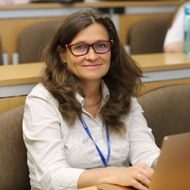- A
- A
- A
- ABC
- ABC
- ABC
- А
- А
- А
- А
- А
‘Interest in the Application of Machine Learning in Bioinformatics Is Growing by the Year’
On August 28–30, HSE University’s Faculty of Computer Science held the 4th Summer School on Machine Learning in Bioinformatics. This year, 670 people registered for the event, and over 300 visited in person. The programme included lectures and seminars on various spheres of bioinformatics: applied bioinformatics and the bioinformatics of DNA, RNA, and proteins; elementary genomics; modern methods of data analysis and molecular biology. The lectures were complemented by practical tasks aimed at different levels of knowledge.
This year, lectures and seminars were delivered by teachers and researchers from different departments of HSE University (the Faculty of Computer Science, the Faculty of Biology and Biotechnology, the International Laboratory of Statistical and Computational Genomics, MIEM), as well as from Moscow State University’s Faculty of Bioengineering and Bioinformatics, the Moscow Institute of Physics and Technology, Skoltech, AIRI, Genotek, and the Sber AI Laboratory.
The school’s participants and organisers shared their impressions.

Maria Poptsova, Chief School Organiser, Head of the International Laboratory of Bioinformatics, Faculty of Computer Science
Everything went very well. I am pleased to say that interest in the application of machine learning in bioinformatics is growing by the year. This is evidenced by the large number of participants who attended all the lectures. We were able to attract excellent specialists from FCS partner companies and leading universities, and this, of course, significantly enriched the programme.
The school also gave people from different fields and even different cities the opportunity to meet, get acquainted, and exchange contacts in order to solve problems together and create new projects. Isn’t that the main thing about our summer school—intensive exchange of knowledge, experience and networking?

Alisa Kabalina, St Petersburg State University, Faculty of Biology
Since grade 11, I have been interested in bioinformatics. This field combines everything I love: mathematics, biology, and programming. I also really like machine learning and artificial intelligence. I liked the school; I learned a lot of new things.
I learned new tools and approaches to solving bioinformatics problems. I’m doing a project on applying language models to protein sequences, so I now have the opportunity to compare different models and their effectiveness at solving this problem. This is the first thing I will do after the Summer School. And in the future, I would like to take part in the development of various models and tools for analysing biological data.

Darya Varvina, Sechenov First Moscow State Medical University, Skoltech
I am interested in bioinformatics as a research tool in neuroscience, in particular, in molecular biology and biochemistry. I did not choose the school by chance; since bioinformatics covers many areas, there are always prospects for gaining new knowledge and skills. The school itself was great—it had cool specialists with working tools, the opportunity to practice theoretical material, excellent session organisation, new acquaintances, and communication.
Lecturer Veniamin Fishman stood out the most. Natural-language processing techniques as tools for working with bioinformatics data is a difficult topic to understand, especially for biologists. However, Veniamin presented the information in accessible language, and the information was easily built into a coherent chain.
The practical activities were suitable for different levels. Almost all the speakers divided the tasks into difficulty levels, which was a big advantage for the audience: no one found it too difficult or too boring. I have a few unsolved problems left, but this is a great excuse to go over the material again at home.

Sabina Mirzaeva, Lomonosov Moscow State University, Faculty of Chemistry, Laboratory of Ribonucleoproteins at Belozersky Institute of Physico-Chemical Biology
I am interested in genetics and molecular biology. The knowledge gained at the Summer School will help me in data processing and planning experiments, in olympiads, and in creating a startup, and it will also allow me to speak a common language with bioinformaticians. I learned about the latest developments in bioinformatics and met some leading experts.
I can highlight Alexander Rakitko’s lecture on the genetic passport and the workshop on the genotypes of Russia’s peoples; I also liked the opportunity to save the script from a practical task and see how real pipelines work.

Dmitry Solovey, Lomonosov Moscow State University, Biotech Campus, Master’s programme in Genomics and Human Health
I work in human genomics and have an interest in machine learning and deep learning, so the conference’s topic fits my interests perfectly. The school turned out to be wonderfully organised. I listened to each lecturer with interest.
What I liked and memorised most were the presentations by Veniamin Fishman and Dmitry Penzar on the application of language models and machine learning methods to genomic data.
In general, applying linguistic methods to genomes is not a new idea. A hot topic now is natural-language processing methods using deep learning; ChatGPT is on everyone’s lips. This is why I was really looking forward to the report by Veniamin Fishman and his colleagues from AIRI about their GENA transformer for solving genomics problems.
I would like to thank the organisers for the networking at this event—I gained many new ideas and useful contacts!

Nikolai Popov, Pirogov Russian National Research Medical University, Laboratory of Bioinformatics at Research Institute for Systems Biology and Medicine
I am interested in biology, bioinformatics, and metagenomics. The knowledge gained at the Summer School will help me begin to apply DL in my practice. Most of all I liked Vladimir Shchur’s lecture ‘Genetics and the History of Populations.’ I would like to see more overview lectures highlighting the benefits and drawbacks of popular and promising methods. It is great that there are creative practical tasks; I liked the possibility of saving the code from the tasks in order to look at it in detail in the future.